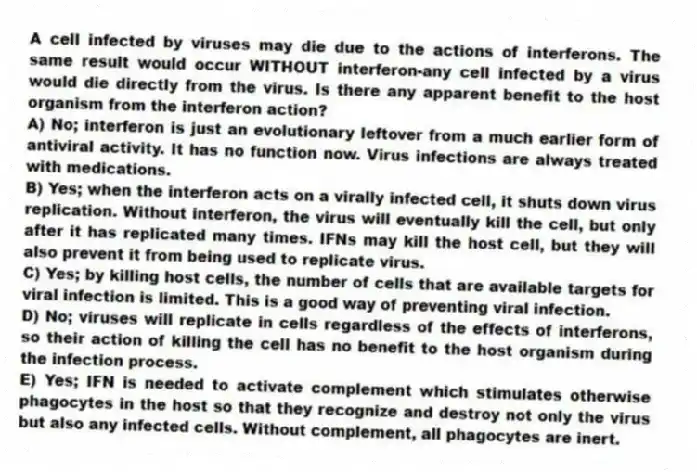
A cell infected by viruses may die due to the actions of interferons. The same result would occur WITHOUT interferon-any cell infected by a virus would die directly from the virus. Is there any apparent benefit to the host organism from the interferon action?
A) No; interferon is just an evolutionary leftover from a much earlier form of antiviral activity. It has no function now. Virus infections are always treated with medications.
B) Yes; when the interferon acts on a virally infected cell, it shuts down virus replication. Without interferon, the virus will eventually kill the cell, but only after it has replicated many times. IFNs may kill the host cell, but they will also prevent it from being used to replicate virus.
C) Yes; by killing host cells, the number of cells that are available targets for viral infection is limited. This is a good way of preventing viral infection.
D) No; viruses will replicate in cells regardless of the effects of interferons, so their action of killing the cell has no benefit to the host organism during the infection process.
E) Yes; IFN is needed to activate complement which stimulates otherwise phagocytes in the host so that they recognize and destroy not only the virus but also any infected cells. Without complement, all phagocytes are inert.
Correct Answer:
Verified
Q71: Please select the correct sequence for the
Q72: Which of the following is a bacterial
Q73: Which of the following is the correct
Q74: Which of the following would NOT trigger
Q75: Which of the following are lymphocytes?
A) B
Q77: How are macrophages and neutrophils similar, and
Q78: A physician is attempting new therapies for
Q79: Please identify the mismatched pair.
A) Kupffer cells-liver
B)
Q80: Please select the True statement regarding Toll-like
Q81: Which of the following is NOT a
Unlock this Answer For Free Now!
View this answer and more for free by performing one of the following actions

Scan the QR code to install the App and get 2 free unlocks

Unlock quizzes for free by uploading documents